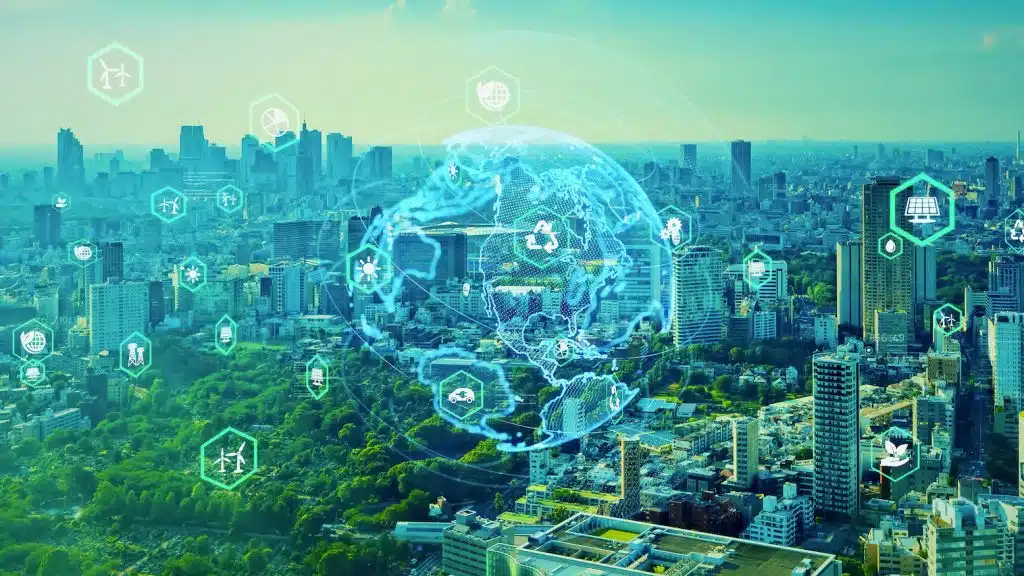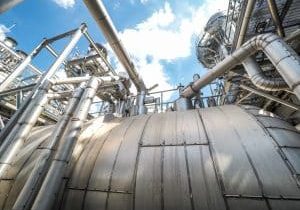According to UN Secretary General António Guterres, who was invited to a summit on sustainable development on March 21st, 2022, our dependence on fossil fuels is "madness." In 2020, 80% of the world's energy consumption was still linked to fossil fuels, according to the IPCC. There is a growing awareness that we need energy resilience. But what does this mean for companies? How can technology and data be key elements of this paradigm shift?
Energy Dependence: A Dead End for Economic Activity

Fossil Fuel Dependence: What Are the Risks for Companies?
Beyond the global warming caused by greenhouse gas emissions, dependence on carbon-based energies represents three main risks for companies: acceptance, availability and accessibility.
Public Acceptance
Over the last decade, policymakers, economic circles, and the general public have all become increasingly aware of the urgency of the climate crisis. The pressure of public opinion on companies to decarbonize their activities is becoming stronger and stronger.
This not only affects brand image, but also the attractiveness of companies:
- In terms of recruitment: the social and environmental responsibility of companies is key to attracting quality profiles,
- On the financial level: this is a criterion that is strongly taken into account by investors today.
Availability of Resources
According to an estimate by the International Energy Agency, global energy demand is expected to grow by 45% by 2030. However, fossil fuel reserves are not infinite.
The peak of conventional oil production is over. Supply capacities have already decreased, with extraction becoming less and less profitable. Hence the need for companies to decarbonize their activities and turn to non-fossil fuels.
Affordability
After a long period of stability, energy prices have risen sharply in recent years. According to estimates, the price per MWh, which has been between 35 and 42 euros for 15 years, could eventually rise to 300 euros by 2023.
This price volatility is a real obstacle for decision-makers, who need to project themselves over the long term. With these rate increases, energy represents an economic challenge for companies and their competitiveness.
Increasing Pressure for Energy Independence
Today, many countries depend on fossil fuel imports. However, these supplies are subject to geopolitical uncertainties. We have been seeing this more and more since the beginning of the conflict in Ukraine, which has called into question Russian hydrocarbon imports into Europe.
At the same time, the regulations introduced by the public authorities following the Paris agreements are increasingly restrictive. The aim is to keep the global temperature increase to 2°C - or even 1.5°C - compared to pre-industrial levels.
Some companies that are leading the way in the fight against global warming are also increasing the pressure on economic markets. This is the case of Microsoft, for example, whose objective is to reach carbon neutrality in 2030 (20 years earlier than the deadline set by the Paris agreements). The company also aims to wipe out the carbon debt that they have accrued since Microsoft's inception by 2050.
Energy Resilience to Ensure Business Continuity
In the face of these uncertainties, which are linked to our dependence on fossil fuels, there has been a growing awareness of the need for energy resilience. Globally, resilience refers to the capacity of a system to absorb shocks and still function, even in the event of a breakdown. Achieving energy resilience thus aims to build a more autonomous society and economy capable of withstanding energy hazards. This implies reducing energy consumption and decarbonizing economic activities.
Three main axes can be considered:
- decarbonization of industrial processes: by various means such as the production of heat from biomass, or the use of solid recovered fuels;
- energy renovation of buildings, 30% of which are still thermal flats;
- optimizing processes and reducing energy consumption through technological innovation and artificial intelligence, for greater energy efficiency without impacting production.
Digital technologies are at the forefront of possible solutions to meet these challenges.
Real-Time Energy Flow Management for Energy Resilience
Controlling energy flows, especially in real time, can play a role in decarbonizing economic activities and optimizing energy performance in companies.
More concretely, this means:
- Collecting data on all energy flows, with access to historical data and guaranteed data reliability;
- Visualizing and monitoring live energy flows;
- Analyzing and anticipating all influencing factors, identifying energy optimization options and simulating performance improvement scenarios.
In the energy renovation of buildings, for example, data can be used to identify thermal flaws, and to associate data with the morphology of a building.
Focus on Energy Resilience within an Ecosystem
Cloud technologies and data sharing make it possible to go beyond a company's perimeters and to cooperate within an ecosystem. After all, energy resilience is a global problem whose solutions must be considered collectively.
To share lessons and encourage innovation, it is necessary for companies to work collectively. The Climate Pledge ecosystem, which brings together Amazon, SEM, and Microsoft, is a good example. Its objective? To achieve carbon neutrality by 2040 thanks to data.
Digital technology can thus be used to improve the energy resilience of companies in the face of climatic, economic, and geopolitical uncertainties that have an impact on fossil fuel prices. However, we must be careful about the carbon emissions generated by the production of data, which, when stored on servers, represent the equivalent of 10% of the world's electricity consumption. For the benefit of all, a more sober and qualitative use of data must be defined and differentiated according to the context. In this respect, METRON advocates the responsible use of data that consists in exploiting existing data to the maximum before considering any additional digitalization.
Do you want to improve your organization's energy resilience?
An Energy Management and Optimization System (EMOS) can help.










